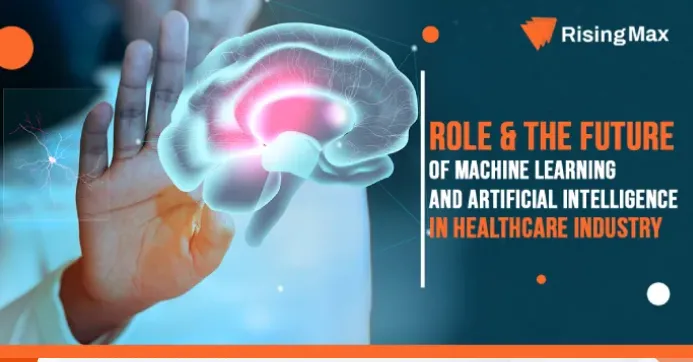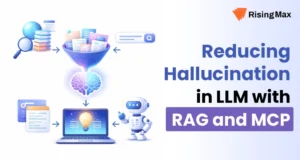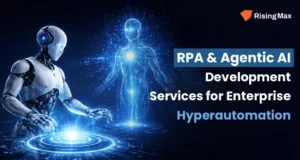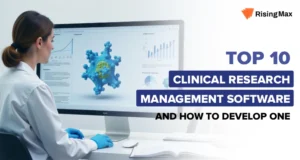You can see how this technology makes it possible for physicians to practice medicine quickly and with greater accuracy. The adventure has only just begun, and it has proven that the future of artificial intelligence in healthcare is all set up to make a big difference.
For decades, artificial intelligence has played a key role in a variety of businesses. Artificial intelligence (AI) has just lately begun to play a significant role in healthcare. AI systems are expected to be a $6 billion business by 20211, according to Frost & Sullivan.
According to a recent McKinsey report, healthcare will be one of the top five industries, with more than 50 AI use cases and over $1 billion in venture capital already raised. What does this mean for your company with such rapid expansion? What are the best ways to get the most out of this game-changing technology?
What Are The Issues in the Current Healthcare Industry?
To train and optimize the performance of the algorithms, an AI system needs a large amount of patient data to be successful. Obtaining access to these databases in healthcare raises a number of issues.
Patient confidentiality and data ownership ethics – access to personal medical records is rigorously controlled. Data sharing between hospitals and AI companies has sparked debate in recent years, raising various ethical concerns:
- Who owns and manages the patient data required to create a new AI solution?
- Should hospitals be allowed to continue to share (or sell) large amounts of de-identified patient data to third-party AI companies?
- How can patients’ privacy rights be safeguarded?
- What are the ramifications (if any) if a security breach occurs?
- What influence will new rules have, such as the General Data Protection Regulation (GDPR) in Europe, which includes a person’s right to have their personal data erased in certain circumstances, with non-compliance potentially resulting in multi-million dollar fines?
Data quality and usability in Healthcare Industry
- Data quality and usability – huge volumes of data are often trustworthy and reliably measured in other industries – for example, aircraft engine sensors or car location and velocity data to estimate highway traffic.
- Clinician notes in electronic medical records are unstructured and difficult to read and process and data in healthcare can be subjective and often wrong – with issues such as Clinician notes in electronic medical records are unstructured and can be difficult to interpret and process;
- Inaccurate data – a patient may be labeled as a non-smoker, but were they simply unwilling to acknowledge they couldn’t quit?
- Many service providers have siloed data sources, making it impossible to gather a complete profile and range of factors for a patient’s health.
Without many delays Let’s Discuss the Future of Artificial Intelligence in the Healthcare Industry
Now it’s possible to find patterns in massive volumes of data that are too subtle or complex for humans to notice, ensuring the future of artificial intelligence in healthcare is significant. It accomplishes this by combining data from a variety of sources that remained siloed in 2020, such as connected home devices, medical records, and, increasingly, non-medical data. In 2030, the first major consequence is that health systems will be able to provide truly proactive, predictive healthcare.
Predictive Care Powered by AI
According to Market.us, the Global Artificial Intelligence Market was valued to be worth USD 129.28 billion in 2022. From 2023 to 2032, it is estimated to reach USD 2967.51 billion growing at a CAGR of 36.8%. The impact of artificial intelligence in healthcare is more significant than ever. AI and predictive analytics help us understand more about the various factors in our lives that influence our health, such as where we are born, what we eat, where we work, what our local air pollution levels are, and whether we have access to safe housing and a stable income, not just when we might get the flu or what medical conditions we’ve inherited.
These are some of the “social determinants of health,” as defined by the World Health Organization (SDOH). This means that, by 2030, healthcare systems will be able to predict when a person is in danger of having a chronic condition and propose preventative steps before the disease worsens.
This progress has been so successful that diabetes, congestive heart failure, and COPD (chronic obstructive pulmonary disease), all of which are influenced by SDOH, are now on the decline.
Employing AI To Better Recognize the People’s Behavior
Hospitals that are connected to each other and to each other’s patients
Along with predictive care, there’s a new innovation in the location of such care. In 2030, a hospital is no longer a single large structure that treats a wide range of diseases; instead, it focuses care on the critically ill and highly complex procedures, while less urgent cases are monitored and treated through smaller hubs and spokes like retail clinics, same-day surgery centers, specialist treatment clinics, and even people’s homes.
A unified digital infrastructure connects all of these places which further shows the positive contribution of powerful AI in the healthcare future. Centralized command centers analyze clinical and geographic data in real-time to keep track of supply and demand across the network.
This network can alleviate bottlenecks in the system and guarantee that patients and healthcare personnel are directed to where they can best be cared for or where they are most needed, in addition to employing AI to recognize people in danger of deterioration.
Location is no longer the glue that holds this network together. Rather, it is the experiences of the individuals it serves that will determine the third major difference in 2030. Artificial Intelligence Market
Improved Patient And Employee Experiences
What makes experiences so valuable? The main role of artificial intelligence in healthcare is that it enables patients to have a direct impact on whether or not they get well, according to studies.
Better work experiences for physicians became increasingly important when they began to suffer from high rates of burnout a decade ago, primarily due to the stress of attempting to serve too many patients with too few resources.
In 2030, an AI-powered predictive healthcare software development company will aid in the reduction of wait times, the improvement of staff workflows, and the alleviation of the ever-increasing administrative burden. The more AI is employed in clinical practice, the more clinicians trust technology to supplement human abilities in areas like surgery and diagnosis.

AI in the healthcare future produces experiences that adapt to the professional and the patient by learning from each patient, diagnosis, and operation. This not only improves health outcomes, but it also minimizes physician shortages and exhaustion while ensuring the system’s financial viability. Furthermore, AI in medical diagnoses has the potential to revolutionize preventive medicine by identifying early warning signs and enabling proactive interventions to prevent the onset of diseases.
This networked system spans communities and is powered by connected care, which connects people, locations, hardware, software, and services to form true care networks that promote long-term health and well-being.
The Impact of Robotics Including Artificial Intelligence in Healthcare
1. AI In Healthcare for Early Detection of Fatal Diseases
AI is already being used to detect diseases more precisely and in their early stages, such as cancer. According to the American Cancer Society, a large percentage of mammograms provide misleading results, resulting in one out of every two healthy women being diagnosed with cancer. AI is allowing mammograms to be reviewed and translated 30 times faster with 99 percent accuracy, decreasing the need for unneeded biopsies.
Consumer wearables and other medical devices give a clear idea that the future of artificial intelligence in healthcare is bright. The technology is being used to monitor and detect potentially life-threatening episodes in early-stage heart disease, allowing doctors and other caregivers to better monitor and detect potentially life-threatening episodes at an earlier, more treatable stage.
2. AI with Machine Learning Helps to Make Decision More Precisely
Predictive analytics can help clinical decision-making and actions, as well as prioritize administrative activities, to improve treatment by aligning massive health data with suitable and timely judgments.
Another area where the role of AI in the future of healthcare is to utilize pattern recognition to identify people at risk of developing a condition – or seeing one worsen – as a result of lifestyle, environmental, genomic, or other factors.
3. Advancement in Treatment with AI in Healthcare
AI can help clinicians take a more comprehensive approach to disease management, better coordinate care plans, and help patients better manage and comply with their long-term treatment programs, in addition to scanning health records to help providers identify chronically ill individuals who may be at risk of an adverse episode.
For more than 30 years, robots have been employed in medicine which shows the bright future of artificial intelligence in healthcare. They range in complexity from small laboratory robots to very complicated surgical robots that may assist a human surgeon or do surgeries on their own.
They’re utilized in hospitals and labs for repetitive work, rehabilitation, physical therapy, and support for those with long-term problems, in addition to surgery.
4. Next-Level Research with AI, BI & Machine Learning in the Industry of Healthcare
The journey from the research lab to the patient is long and expensive. A medicine takes an average of 12 years to get from the research lab to the patient, according to the California Biomedical Research Association. Only five out of every 5,000 medications that start in preclinical testing make it to human testing, and only one of those five gets authorized for human use.
Furthermore, it costs an average of $359 million for a company to create a new drug from the lab to the patient.
The main role of artificial intelligence in healthcare is drug research and discovery. There is the potential to drastically reduce both the time to market for new pharmaceuticals and their prices by directing the current breakthroughs in AI to streamline the drug discovery and drug repurposing processes.
Few More Roles of Artificial Intelligence Will Impact Healthcare
Artificial intelligence is on the verge of becoming a game-changing force in healthcare. How will the impact of artificial intelligence in healthcare and its tools help clinicians and patients?
Reduce The Risks Of Using Electronic Health Records
EHRs have aided the healthcare industry’s transition to digitalization, however the change has resulted in a slew of issues such as cognitive overload, endless documentation, and user burnout.
The future of artificial intelligence in healthcare is aimed at more simplified processes. Artificial intelligence is now being used by EHR developers to design more intuitive interfaces and automate some of the repetitive tasks that take up so much of a user’s time.
According to Adam Landman, MD, Vice President and CIO at Brigham Health, users spend the majority of their time on three tasks: clinical recording, order entry, and sorting through the in-basket.
Resistance To Antibiotics: Management Of The Risks
Data from electronic health records can aid in the detection of infection patterns and the identification of people at risk before they develop symptoms. Using machine learning and AI to drive these analytics can improve their accuracy and give healthcare providers with faster, more accurate alerts.
Improving Medical Devices And Machines With Intelligence
“When we’re talking about combining heterogeneous data from throughout the healthcare system, merging it, and creating an alarm that would warn an ICU doctor to intervene early on,” said Mark Michalski, MD, Executive Director of the MGH & BWH Center for Clinical Data Science.
By incorporating clever algorithms into these devices, clinicians may lower their cognitive load while ensuring that patients receive care as quickly as feasible.
Promoting The Use Of Immunotherapy In The Treatment Of Cancer
Immunotherapy is one of the most promising approaches to cancer treatment. Patients may be able to defeat difficult tumors by utilizing the body’s own immune system to assault them. However, existing immunotherapy alternatives only benefit a tiny percentage of patients, and oncologists still lack a precise and accurate approach for determining which patients may benefit from this treatment.
Machine learning algorithms and their ability to synthesize very complex information may open up the doors for the future of artificial intelligence in healthcare.
At The Bedside, Revolutionizing Clinical Decision Making With Artificial Intelligence
In the same way that the healthcare business is moving away from fee-for-service, it is also moving away from reactive care. Every physician wants to be ahead of chronic diseases, expensive acute events, and unexpected deterioration, and reimbursement mechanisms are finally allowing them to create the processes that will allow proactive, predictive interventions.
Predictive analytics and clinical decision support technologies that alert doctors to problems long before they would otherwise realize the need to intervene will be powered by artificial intelligence, which will offer much of the underpinning for that evolution.
The future of artificial intelligence in healthcare shines bright as it is highly used technology across industries. For illnesses like seizures or sepsis, AI can provide earlier warnings, which frequently necessitate intense study of large datasets.
According to Brandon Westover, MD, Ph.D., Director of the MGH Clinical Data Animation Center, machine learning can help support decisions on whether to continue caring for critically ill patients, such as those who have entered a coma following cardiac arrest.
Conclusive Role of Artificial Intelligence in Healthcare
Background or Introduction
Researchers and health professionals are paying attention to the impact of artificial intelligence in healthcare. Few earlier research, including accounting, business and management, decision sciences, and health professions, have looked into this problem from a multidisciplinary approach.
Methods
The researchers were able to collect 288 peer-reviewed papers from Scopus thanks to the systematic literature review and its rigorous and repeatable research process. The authors analyzed authors, publications, keywords, and researcher collaboration networks using qualitative and quantitative characteristics. The Bibliometrics software package was also beneficial to the paper.
Results
The inquiry revealed that there is a growing body of knowledge in this sector. It focuses on clinical decision-making, health services management, predictive medicine, patient data and diagnostics, and patient data and diagnostics. The highest number of studies came from the United States, China, and the United Kingdom. AI can assist clinicians in establishing diagnoses, forecasting disease spread, and customizing treatment pathways, according to keyword analysis.
Conclusion
There are various AI applications for healthcare in the literature and a stream of research that has not been thoroughly addressed. For data-intensive analysis and knowledge-based management, AI projects, for example, necessitate skills and data quality awareness. Researchers and health professionals can use insights to better understand and address the future of artificial intelligence in healthcare.











